Key takeaways:
- Thumb sucking is a common self-soothing behavior in children, but peer pressure can influence its persistence.
- Prolonged thumb sucking may lead to dental issues such as misalignment and bite problems, impacting a child’s oral health and speech development.
- Positive reinforcement and healthy distractions are effective strategies for parents to help children overcome thumb sucking habits.
- Understanding the emotional roots and social dynamics surrounding thumb sucking can aid parents in supporting their children during this developmental phase.
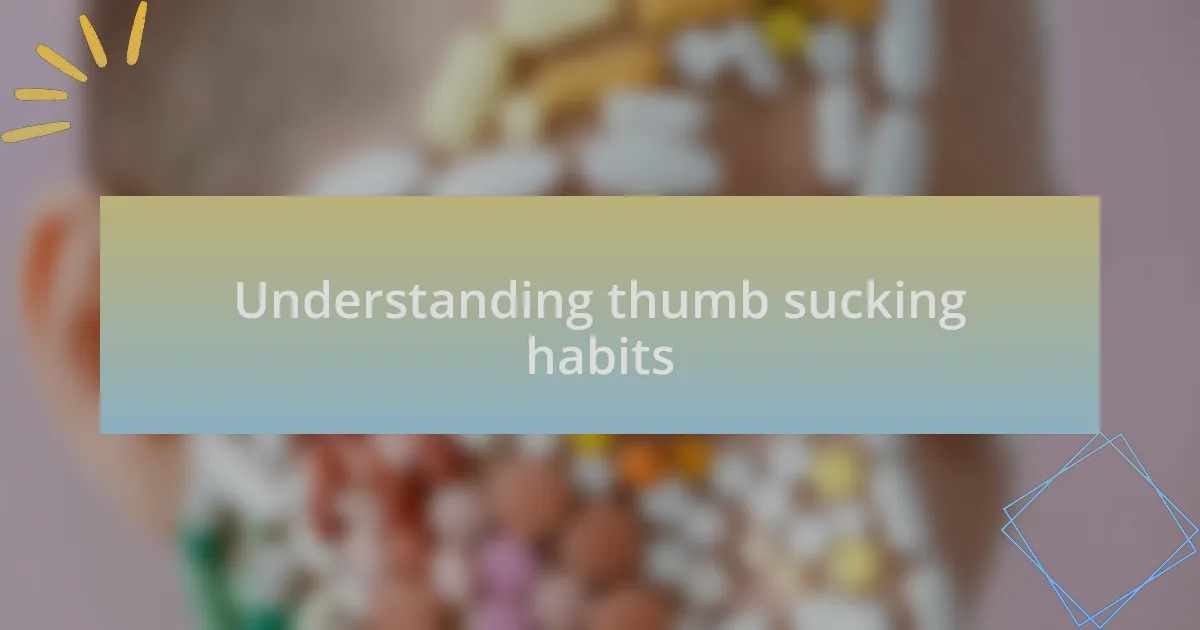
Understanding thumb sucking habits
Thumb sucking is a common behavior in young children, often beginning in infancy as a self-soothing mechanism. I still remember watching my niece curl up with her favorite blanket, thumb in her mouth, as a way to comfort herself during naptime. It can be striking how such a simple action can provide a sense of security and calm in a child’s life.
As children grow, many naturally outgrow thumb sucking without intervention, but I’ve seen how peer pressure and social situations can play a significant role. For instance, I once saw a friend’s child struggle when another kid pointed out her thumb sucking during a playdate. It really made me think about how children navigate their habits as they become more aware of their surroundings.
To understand thumb sucking habits better, I often wonder what drives a child to continue as they develop. Is it a need for comfort, or perhaps a way to cope with stress? I believe recognizing the underlying emotions tied to thumb sucking can guide parents in supporting their children during this phase. By engaging in open conversations, it’s possible to help kids find other comforting strategies that promote emotional health.
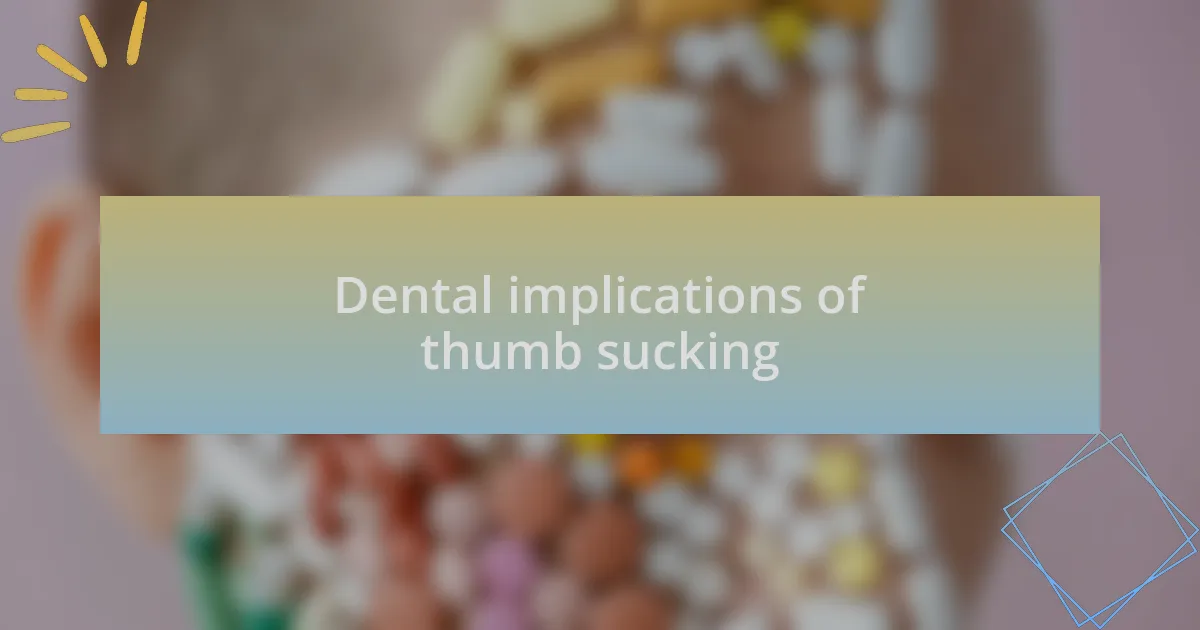
Dental implications of thumb sucking
Thumb sucking can have various dental implications that parents should consider. For instance, prolonged thumb sucking can lead to alignment issues with the teeth and jaw. I recall a patient who frequently thumb-sucked even past the age of five. She faced challenges with her bite due to this habit, requiring orthodontic intervention later on. Isn’t it interesting how something that seems harmless can lead to such complications?
In my practice, I’ve observed that thumb sucking can also affect the roof of the mouth, altering its shape over time. It’s fascinating to think about how a small action, repeated nearly unconsciously, can reshape dental structures. I often ask parents to reflect on the long-term impact—how could this seemingly innocent habit lead to future dental appointments that might have been avoidable?
Additionally, thumb sucking may contribute to speech issues, further complicating a child’s development. I’ve seen kids who had trouble pronouncing certain sounds due to changes in their oral cavity attributed to thumb sucking. Have you ever considered how closely linked these habits are to a child’s overall growth? This connection underscores the importance of addressing thumb sucking early on, as it can pave the way for healthier dental and speech development.
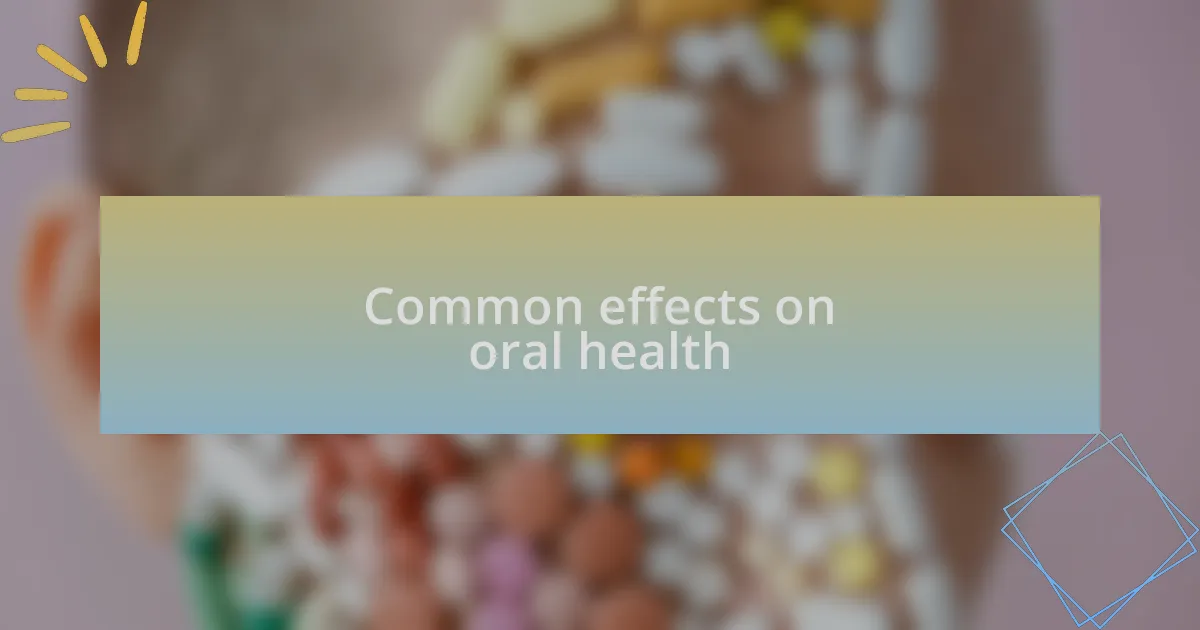
Common effects on oral health
Thumb sucking doesn’t just seem innocent; its impact on oral health can be significant. I remember a young boy who came into my office with a misaligned smile because of his thumb-sucking habit lasting well into his preschool years. It made me realize how early intervention can sometimes prevent these complications, but many parents don’t see the potential risks until it’s too late.
One of the more surprising effects I’ve witnessed is the emergence of bite problems. I had a case where a child’s underbite developed largely due to thumb sucking. When we addressed the issue, it led to a much better bite and overall oral function. Can you imagine how different their eating experiences could have been if the habit had been addressed sooner?
Moreover, thumb sucking can influence the soft tissues in the mouth, leading to changes in the gums and oral posture. I’ve seen children whose mouths were virtually transformed by this habit, which meant they required more frequent dental visits to correct these changes. It makes me wonder: how often do parents connect these habits with their child’s future dental journeys? Recognizing these patterns early can truly set the path for better oral health down the line.
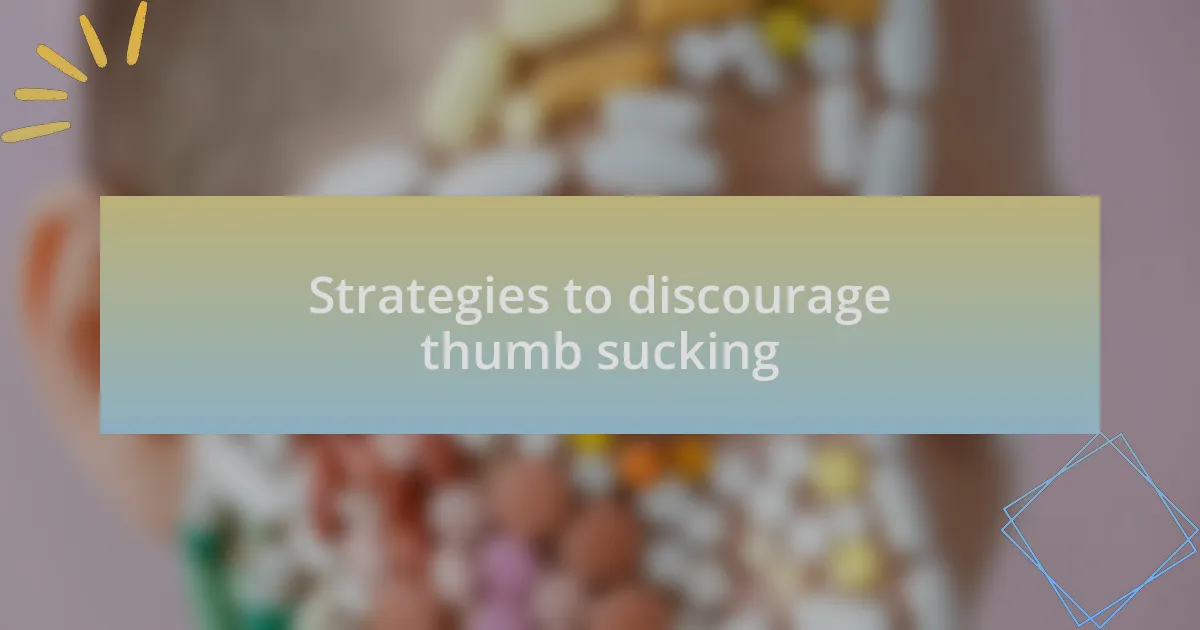
Strategies to discourage thumb sucking
When it comes to discouraging thumb sucking, positive reinforcement can be incredibly effective. I recall advising a concerned mother who began tracking her child’s progress with a sticker chart. Each day without thumb sucking earned her child a sticker, and the excitement in their eyes was palpable. It made me realize that celebrating small victories can motivate children to break the habit.
Another strategy that I have found helpful involves creating distractions. One parent I worked with introduced various soothing alternatives, like chewable jewelry or fidget toys, during moments when her child felt the urge to suck their thumb. Watching her child explore these new options made me think about how important it is for kids to have healthy substitutions readily available.
Moreover, gentle reminders can play a crucial role in this process. I remember advising a father to subtly remind his daughter about her thumb-sucking when he noticed it happening, using a soft tone so she wouldn’t feel shamed or embarrassed. I think it’s vital to approach these reminders with empathy, as it fosters an open dialogue and helps kids feel supported rather than punished. After all, wouldn’t you prefer gentle guidance over criticism during a challenging time?
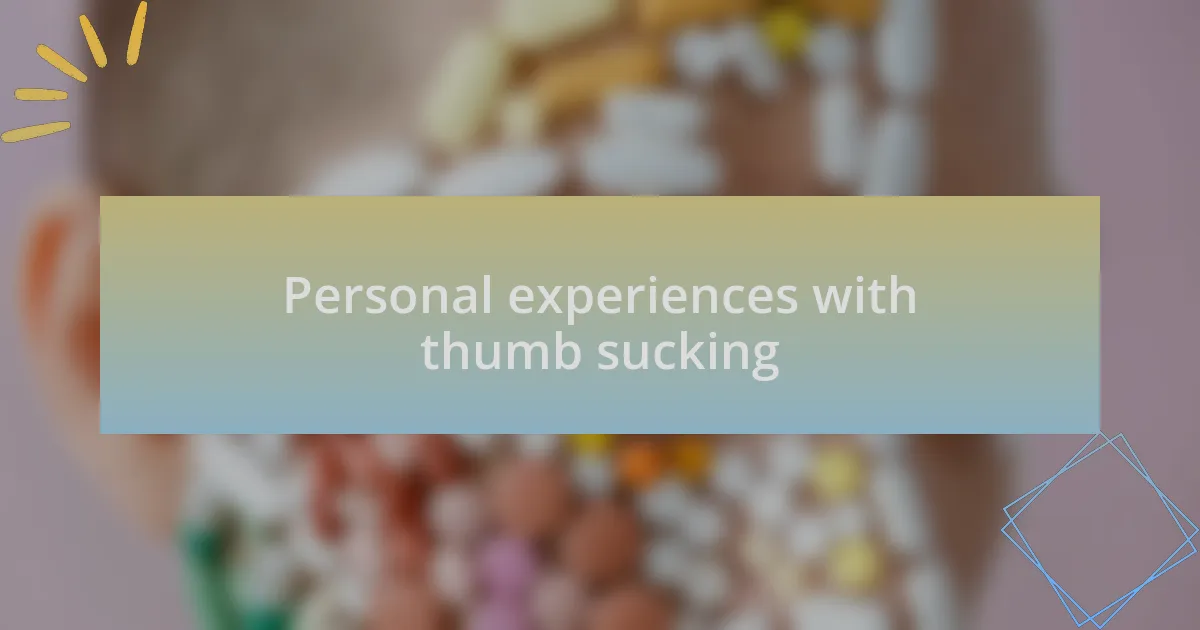
Personal experiences with thumb sucking
As a child, I was a persistent thumb sucker, often retreating to my favorite corner of the living room for comfort. I vividly remember the warm feelings of safety that came with curling up on the couch, thumb in mouth, while my mom read aloud to me. It strikes me how those moments shaped my understanding of security, but also how they inadvertently made it harder for me to let go of that soothing habit as I grew older.
In reflecting on my experience, I realize that the gentle nudging from my parents was foundational. They tried various techniques, including making a game out of it—a friendly challenge that had me thinking about alternatives to thumb sucking. Can you imagine how different my journey might have been if I had felt more pressured to conform to expectations? That collaborative support gave me the confidence to explore other comforting methods without feeling shamed.
Looking back, I can appreciate how the experience was multifaceted—there were times of frustration and embarrassment, especially during school hours. On one occasion, a classmate noticed my habit and pointed it out in front of others, which was a wake-up call for me. This moment taught me about the power of peer influence and the very real emotions tied to our habits. It reminds me that when children grapple with thumb sucking, they are navigating a complex emotional landscape, and our understanding can make all the difference.